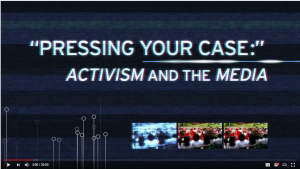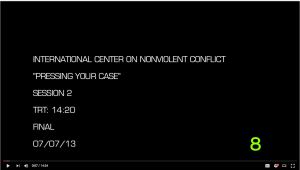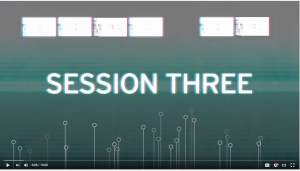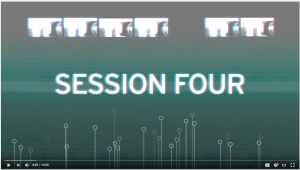 Pressing Your Case: Nonviolent Movements and the Media (Part 1)
Pressing Your Case: Nonviolent Movements and the Media (Part 1)
Organizers and strategists of nonviolent movements often struggle in dealing with the mainstream news media. Some consider it their enemy, because coverage can be patchy or inaccurate. Others unrealistically expect the media to advocate for their causes. Yet few resources for activists have provided a reliable explanation of how an effective relationship between a movement and the media might look, and how movement participants can best approach the mainstream media in order to generate interest.
The International Center on Nonviolent Conflict (ICNC) has helped develop “Pressing Your Case: Nonviolent Movements and the Media,” an educational video series to explore ways that nonviolent campaigns and movements can better relate to world media. It features four sessions, hosted by internationally known news anchor Riz Khan, and written and produced by LikelyStoryMedia@gmail.com in collaboration with Howard Barrell, a journalist and activist during the struggle against apartheid in South Africa, who is now a senior lecturer in journalism at Cardiff University. This series discusses best practices in enhancing the value of media coverage that campaigns receive.
 Pressing Your Case: Nonviolent Movements and the Media (Part 2)
Pressing Your Case: Nonviolent Movements and the Media (Part 2)
Organizers and strategists of nonviolent movements often struggle in dealing with the mainstream news media. Some consider it their enemy, because coverage can be patchy or inaccurate. Others unrealistically expect the media to advocate for their causes. Yet few resources for activists have provided a reliable explanation of how an effective relationship between a movement and the media might look, and how movement participants can best approach the mainstream media in order to generate interest.
The International Center on Nonviolent Conflict (ICNC) has helped develop “Pressing Your Case: Nonviolent Movements and the Media,” an educational video series to explore ways that nonviolent campaigns and movements can better relate to world media. It features four sessions, hosted by internationally known news anchor Riz Khan, and written and produced by LikelyStoryMedia@gmail.com in collaboration with Howard Barrell, a journalist and activist during the struggle against apartheid in South Africa, who is now a senior lecturer in journalism at Cardiff University. This series discusses best practices in enhancing the value of media coverage that campaigns receive.
 Pressing Your Case: Nonviolent Movements and the Media (Part 3)
Pressing Your Case: Nonviolent Movements and the Media (Part 3)
Organizers and strategists of nonviolent movements often struggle in dealing with the mainstream news media. Some consider it their enemy, because coverage can be patchy or inaccurate. Others unrealistically expect the media to advocate for their causes. Yet few resources for activists have provided a reliable explanation of how an effective relationship between a movement and the media might look, and how movement participants can best approach the mainstream media in order to generate interest.
The International Center on Nonviolent Conflict (ICNC) has helped develop “Pressing Your Case: Nonviolent Movements and the Media,” an educational video series to explore ways that nonviolent campaigns and movements can better relate to world media. It features four sessions, hosted by internationally known news anchor Riz Khan, and written and produced by LikelyStoryMedia@gmail.com in collaboration with Howard Barrell, a journalist and activist during the struggle against apartheid in South Africa, who is now a senior lecturer in journalism at Cardiff University. This series discusses best practices in enhancing the value of media coverage that campaigns receive.
 Pressing Your Case: Nonviolent Movements and the Media (Part 4)
Pressing Your Case: Nonviolent Movements and the Media (Part 4)
Organizers and strategists of nonviolent movements often struggle in dealing with the mainstream news media. Some consider it their enemy, because coverage can be patchy or inaccurate. Others unrealistically expect the media to advocate for their causes. Yet few resources for activists have provided a reliable explanation of how an effective relationship between a movement and the media might look, and how movement participants can best approach the mainstream media in order to generate interest.
The International Center on Nonviolent Conflict (ICNC) has helped develop “Pressing Your Case: Nonviolent Movements and the Media,” an educational video series to explore ways that nonviolent campaigns and movements can better relate to world media. It features four sessions, hosted by internationally known news anchor Riz Khan, and written and produced by LikelyStoryMedia@gmail.com in collaboration with Howard Barrell, a journalist and activist during the struggle against apartheid in South Africa, who is now a senior lecturer in journalism at Cardiff University. This series discusses best practices in enhancing the value of media coverage that campaigns receive.